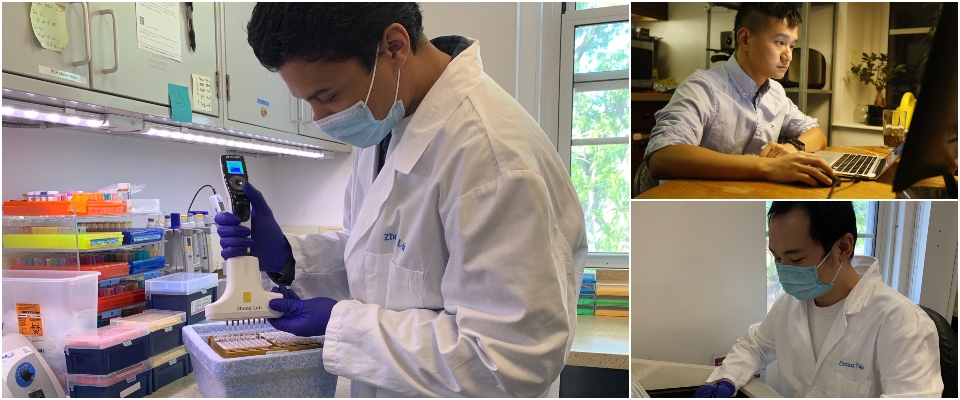You are here

Carrying on at the Institute – Spotlight: Zhong Lab
As we carry on with our mission during the COVID-19 pandemic, Burke Neurological Institute (BNI) is slowly and safely bringing back laboratory personnel to campus. Dr. Jian Zhong, director of the Molecular Regeneration and Neuroimaging Laboratory at Burke Neurological Institute and Associate Professor of Weill Cornell Medicine share what it is like to return to their laboratory in shifts to keep important research investigation moving forward.
How has your lab adapted to conducting research during the COVID-19 pandemic?
In normal times we are a very hands-on experimental lab, performing surgical spinal cord injury experiments on genetically modified animal models and documenting the effects of regeneration-promoting treatments over a span of multiple weeks. The coronavirus pandemic brought an abrupt halt to our laboratory based experiments in mid-March. With extra time on our hands we took the opportunity to delve more deeply into literature. An extra series of Zoom journal clubs gave our technicians, students and postdoctoral trainees a chance to advance on their presentation skills, and we all enjoyed extended brainstorming sessions after these talks.
One of our predoctoral exchange students pivoted to an in silico project aiming to understand the molecular dynamics of regenerating corticospinal neurons. He learned and practiced new bioinformatics skills in many Zoom meetings with the Bioinformatics Core facility at Weill Cornell Medicine and a commercial service provider, which in turn provided exciting new insights for our research projects. Some new avenues we may pursue in the coming year include the selective activation of certain transcription factors that have emerged from these bioinformatics analyses, to assess their roles in acute versus long-term regeneration and reconnection of spinal networks after a traumatic injury of the spine.
This summer we have also been able to obtain agency funding as well as IRB approval for a phase I clinical study to test a new non-invasive treatment technique for people living with a spinal cord injury, in collaboration with the Kessler Rehabilitation Institute in New Jersey.
The pandemic has certainly reinforced the classic lesson of “seize the day” for each of us. Much lab time was lost, and our collaboration with Cornell University in Ithaca, New York remains frozen. A postdoctoral scholar who expected to join our lab early this year has been unable to travel to the United States. We are very grateful to the Craig H. Neilsen Research Foundation for new supplementary funding meant to offset some of the pandemic’s detrimental effects on our research. Now, as the Burke Neurological Institute gingerly reopens, we are eager to restart our experimental work, rebuild our mouse colony, and test new ideas we hatched over the summer—while of course stringently maintaining the precautions that will continue to keep us and those around us safe from the SARS-CoV2 infection.
What are you most proud of as a lab right now?
Without the everyday casual interactions, I believe we have greatly improved our team’s tele-communication and time management skills. Lab members have taken on extra responsibilities for animal care, and with working staggered shifts including weekends and nights, we have kept our losses to a minimum. We are proud to be a strong team dedicated to spinal cord injury research, and proud to embark on our first phase I clinical trial soon.



